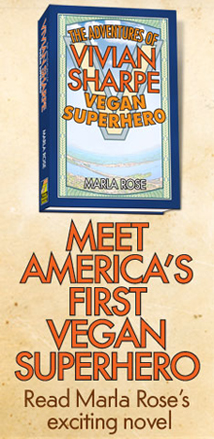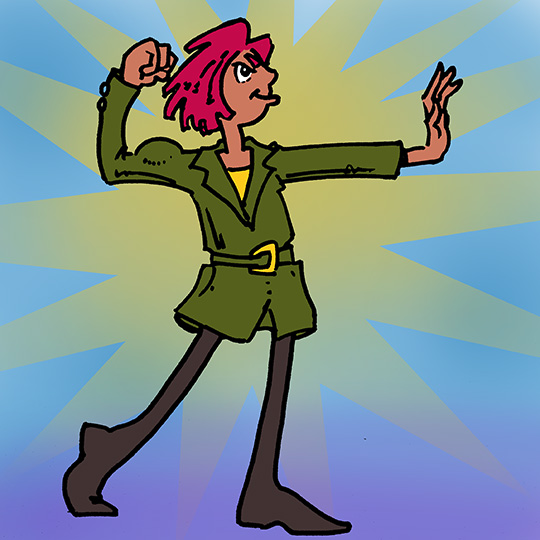
Available in either softbound or Kindle/Nook/etc. eBook at Amazon
viviansharpe.com

  6 Stay Strong Against Social Pressure and Gain Resilience as a Vegan. While this is covered a little in Chapter 2 and a bit more in Chapter 4, a special section on this topic is called for because, frankly, social pressure can exert such unique and formidable challenges to new herbivores that many vegan vows wither in the face of it. In my years as a vegan advocate, by far, I have heard “social pressure,” in so many words, as the biggest obstacle to someone’s successful transition to veganism. By social pressure, I don’t mean a tormentor trying to tempt you with beef jerky in the hall between math and art class but much more insidious pressures that can activate our most primitive worries about isolation and non-conformity. Let’s talk about the various social pressures one might face as a vegan first. This pressure could take the form of parents or grandparents who act like you are rejecting them personally by going vegan. This pressure could take the form of a partner who is now feeling cut off from you. This pressure could take the form of longtime friends who suddenly feel estranged from you. This pressure could take the form of classmates, coworkers or colleagues who snicker at you or who exclude you from group outings. This pressure could take the form of being the only one who gets a meal that looks different from everyone else’s at the table when dining out, or of feeling self-conscious when you place your order. This pressure could take the form of it being implied that you are “difficult,” “neurotic” or “high-maintenance.” This pressure could take the form of extended family members who think you are now a killjoy at holiday time. This pressure can come in many, many forms, and it can be subtle or overt, internal or external in nature. Suffice it to say, even for those of us who are fairly resolute in our convictions and don’t mind being rebels, these pressures can be a lot to withstand, especially during those challenging early months. Just by virtue of being vegan, we are often perceived as the proverbial fly in the ointment, the elephant in the room, the prude at the nudist colony or any other saying that conveys “enemy of fun” to nearly everyone else. Much of this isn’t necessarily baggage that we’ve accumulated on our own but that which is pushed on us by those we interact with, people who are often deeply, but unknowingly, invested in reinforcing the mentality and practice that says other animals exist for our ends, people who may very well have their own unacknowledged ambivalence about it. I believe that it’s that tension between wanting to maintain certain privileges and the innate discomfort around those very privileges – or what maintaining them says about the person in question – that creates much of the defensive pushback that vegans experience from strangers and loved ones alike. As a new vegan, perhaps you’ve already experienced having someone react defensively to you once they learn that you’re vegan even if you haven’t said much of anything. That is because a vegan gives form to what many people would prefer to not think about. Compounding this tension is the fact that just by living in the world, we are going to have some or perhaps many old wounds with our families of origin and even longtime friends, which can make a decision to be vegan potentially fraught with lots of opportunities for people to react to you in defensive, disparaging, angry or hurt ways that may have nothing to do with your veganism. Those who don’t have a background with you will also have their presumptions, triggers and histories, so as a vegan, often you will inadvertently press buttons that can have people reacting around you in ways that are not always fair, rational, compassionate or welcome. This is a tricky and sometimes exhausting landscape to try to navigate, especially with all that baggage on your back. Some of the baggage we carry might be the notion that we are judging others by simply living in the world as vegans or the presumption that because we’re vegan, we’re imposing our beliefs upon others. Baggage can also be much more complicated and insidious, like the baggage you carry for being a reminder of a non-vegan’s unresolved guilt or mixed feelings about eating animals as I mentioned earlier. It can also manifest as people thinking that your mere existence as a vegan is a direct attack on their character, heritage, upbringing, and so on. Regardless of what that baggage may be, it can result in a pushback against you. That pushback can take the form of shaming, passive-aggression, exclusion, mocking, undermining, defensiveness, guilt-tripping and having insecurities projected onto you. That’s just the external baggage, too. The internal baggage you carry may be exacerbated by your decision to be vegan, for example, the idea that you don’t deserve to be heard, that you ruin everyone’s fun, that you are a hassle, that people don’t like you and you don’t deserve consideration. JEEZ. This is intense stuff! So all that said, I’ve got good news and bad news for you. The bad news first: the social pressures don’t go away. The good news? They get much, much easier to navigate with time. Even better news? If you have felt in the past that you had to suppress your needs or your voice in order to keep the peace, a vegan practice will help to kick that self-silencing habit to the curb. This fear of straying and being different is challenging for us on a biological level as we are a species with pack instincts; the fear of being excluded from the tribe is real and the thought of being cast out exposes our most ancient wiring around vulnerability, seclusion and mortality. Whether or not the anxiety about being ostracized is rational, our bodies and brains will often perceive the threat of exclusion in a primordial way: fearfulness, worry, and an overriding urge to conform may be the result of getting pushback, or even fear of pushback, against your veganism. This guttural reaction may have gotten us out of jams throughout history – I mean, it’s great for when we’re being chased by saber-toothed tiger – but it leaves us, sadly, with a tendency to react to emotional vulnerability and actual threats with the same kind of inflated adrenaline response, which is implanted right in the amygdala nuclei of our temporal lobes. So, please understand that if you have a fearful response to conflict or rejection, it is part of your very physiology and it can feel on some level like your survival is at stake. This is not to say that this response can’t be dismantled, but it is to say that you should be patient with yourself if you are feeling scared or insecure about the reactions from your “tribe” to your veganism. It doesn’t mean you’re weak; it means you’re human. With that said, here are some words of advice that might help. Don’t:
Do:
Remember that in the social realm, we can and should be prepared for the occasional hiccup but that there is much we cannot anticipate, including positive responses. You may lose some friends or estrange some family in your transition to veganism but it doesn’t need to be permanent. Try to remain nimble and remember that every time you positively engage with the world as a vegan, you are helping to normalize it. Your veganism may be met with defensiveness or resistance but have no doubt that this normalization most certainly is happening, thanks to you. This chapter wouldn’t exist if living in the world as a vegan wasn’t met with some pushback, though. Let it roll off you, find a supportive vegan community, develop your voice and carry on! < Previous page . . Next page > ALL CHAPTERS Intro: Welcome new vegan! 1. Finding your way in an imperfect world 2. Make peace with making mistakes 3. Find community 4. Don't overload on disturbing videos and content 5. Develop your vegan voice and assertiveness 6. Stay strong against social pressure and gain resilience as a vegan 7. Learn how to cook, even just a little 8. Technology helps you over hurdles 9. Listen to vegan podcasts 10. Take advantage of other resources 11. The health benefits of a plant-based diet 12. Don't let yourself get famished 13. Expect that your digestive system might take a little while to get straightened out 14. Untangle and tame food cravings 15. Dining out as a vegan 16. A primer on vegan kitchen appliances, tools & gadgets 17. Bring joy to your vegan practice © 2013-2018, Vegan Street |













 |
 |
 |
 |
 |
 |
 |